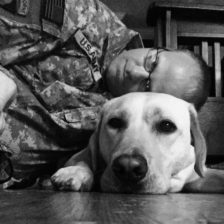I’ve been asked if I am Sam’s caregiver. The answer is yes. Then someone asked me what that is like, what do I do?
A military caregiver is a family member, friend, or aquaintance who provides a broad range of care and assistance for, or manages the care of, a current or former military service member with a disabling physical or mental injury or illness.
Sometimes saying that I am a caregiver makes people ask or wonder what is wrong with Sam. And, as some of you know, Sam suffers from PTSD, TBI, he has chronic back pain, a massive amount of kidney stones (I’ve honestly lost count), anxiety/panic attacks, and also migraines. That covers some of it—not all of the symptoms and signs that I have to be on alert for, or recognize when he is starting to feel bad.
Caregivers to military veterans face unique challenges. Some caregivers put their own career or college plans on hold due to the medical needs of their spouse or significant other. Challenges can take an emotional, financial, and physical toll on the veteran and the veteran caregivers. When I realized I was a military caregiver, I wondered if there were other folks who went through some of the ups and downs and challenges that I have faced before—just to talk, or understand experiences, too.
And I found them. I found other caregivers, and I made a connection with people who have similar experiences like me. If you know a veteran caregiver, remind them they are not alone. Offer to help and support them, buy them a cup of coffee, give them a listening ear.
If you are a veteran caregiver, and if you need some support or ideas for some resources, check out the following:
1. VA Cargiver—this provides a monthly stipend, travel expenses, health insurance, caregiver training, and up to 30 days of respite care per year from home caregivers of seriously wounded warriors. The veteran must be enrolled in the VA to receive these benefits for their caregiver.
2. The VA Coaching into Care—provides caregiver support over the phone. This is a national telephone service of the VA which aims to educate, support, and empower family members and friends who are seeking care or services for a veteran. The number is 888-823-7458.
3. The Military Veteran Caregiver Network (MVCN)—connects military caregivers with hundreds of partner organizations to provide caregivers, finds a mentor, or search their resource library. The MVCN provides pre-and post-9/11 era military and veteran caregivers with peer support to reduce their isolation and increase their sense of connectedness, engagement, hopefulness, wellness, knowledge, and skills.
4. The Elizabeth Dole Foundation—has multiple programs to assist caregivers. The Caregiver Community Program raises awareness of caregiver needs. Hidden Heroes provides support and resources for the caregiver community. The foundation also assists with training programs and job searches for caregivers. Visit elizabethdolefoundation.org to learn more. (Also, my good friend, Corrine Hinton, is a Dole Fellow for the state of Texas)
5. Hidden Heroes (Hidden Heroes Site) seeks to raise awareness of the issues military caregivers confront every day, inspire individuals, businesses, communities, and civic, faith and government leaders to take action in supporting military caregivers in their communities, and establish a national registry encouraging military caregivers to register at Hidden Heroes to better connect them to helpful resources and support.
There’s something about being able to connect with someone, or a group of people who you can relate to—who you can share stories with—who you can be yourself around. I’m happy to have found those caregivers. I’m thankful for their encouragement and inspiration. Most importantly, I’m thankful for their friendship.

Of all the hats and titles I have, I am proud to add military caregiver to the list.
